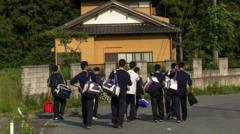A recent survey indicates that 80% of Japanese teen boys have yet to kiss, with girls showing similar trends. Experts attribute the decline to pandemic-related restrictions and societal changes, raising concerns about the country’s low birth rate.
Japan's Youth Struggles with Intimacy as Kiss Rates Hit Record Lows

Japan's Youth Struggles with Intimacy as Kiss Rates Hit Record Lows
New survey reveals alarming trends in teenage romantic experiences in Japan, with a significant drop in first kisses and sexual activity since the onset of the pandemic.
In a striking revelation for a society where romantic milestones are typically celebrated, a new study has highlighted a concerning trend among Japan's youth regarding intimate experiences. According to a survey conducted by the Japan Association for Sex Education (Jase), a staggering four out of five boys aged 15 to 18 in Japan have yet to experience their first kiss. Girls are not faring much better, with only one in four female high schoolers reporting the same.
These figures represent the lowest recorded rates since the data collection began in 1974 and could pose serious implications for a nation already grappling with one of the world’s lowest birth rates. The comprehensive survey involved 12,562 students from various educational levels, including junior high schools and universities, and explored topics ranging from kissing to sexual intercourse.
The decline in first kisses over the years mirrors a broader trend noted since 2005. The latest findings have also documented a decrease in the frequency of sexual intercourse among teenagers, with reported cases dropping among high school boys to just 12%, a decline of 3.5 points since 2017. Female counterparts saw a similar dip, with only 14.8% admitting to having had sexual relations.
Experts suggest that the Covid-19 pandemic may have played a significant role in this decline. Yusuke Hayashi, a sociology professor at Musashi University, emphasized that the restrictions enforced during the pandemic likely impacted adolescents at a crucial developmental stage when they were beginning to explore their sexuality.
Despite these declines, the survey revealed an increase in self-reported masturbation among teenagers across all demographics, indicating a shift in how young people are expressing their sexual feelings.
The survey results are particularly alarming in light of a separate study from earlier this year, which found that nearly half of marriages in Japan are sexless. With the birth rate plummeting, former Prime Minister Shinzo Abe had previously warned that the declining numbers could threaten Japan's ability to sustain itself as a society. Researchers have speculated that the population, currently at 125 million, could navigate down to fewer than 53 million by the century's end if these trends persist.
Various factors contributing to this demographic crisis include escalating living costs, increased female participation in education and the workforce, and better access to contraception, all leading women to consider having fewer children. With Japan already facing the challenges of the oldest population globally, as measured by individuals aged 65 and older, the outlook appears increasingly bleak. In a sign of changing societal needs, Oji Holdings, a major diaper manufacturer, has announced a shift from producing baby products to focusing on adult diapers, highlighting the urgent demographic shifts occurring within the nation.
As countries across Asia implement measures to encourage higher birth rates, the question remains: can Japan address the evolving dynamics of youth relationships and overcome its demographic challenges?



















